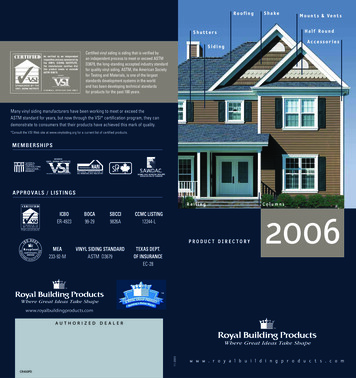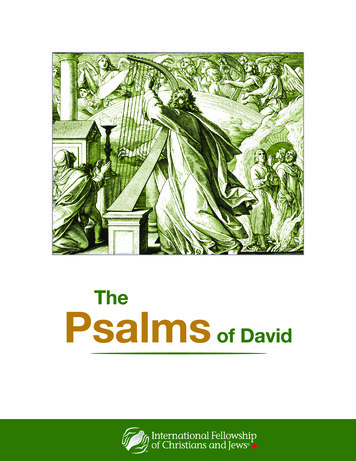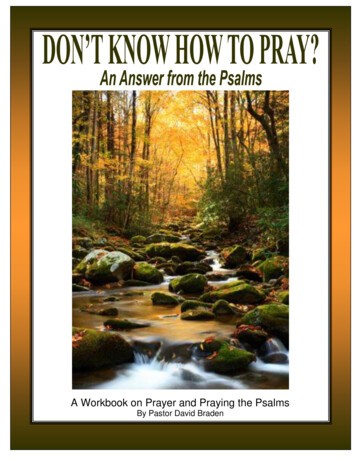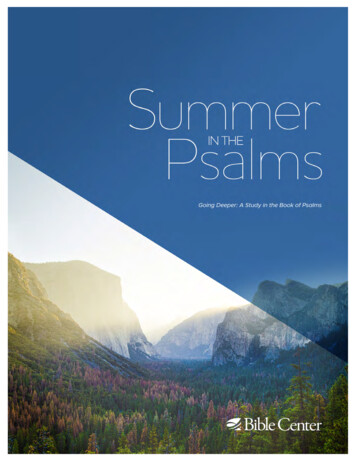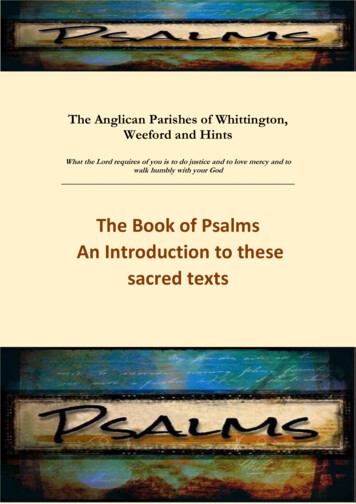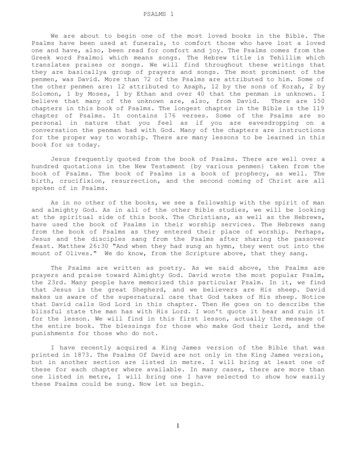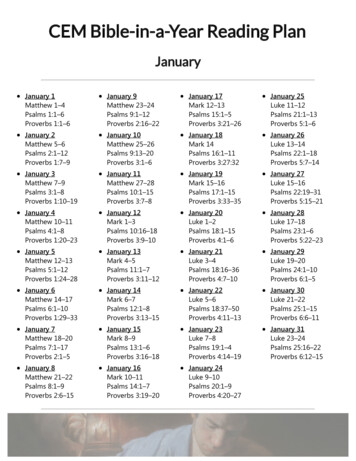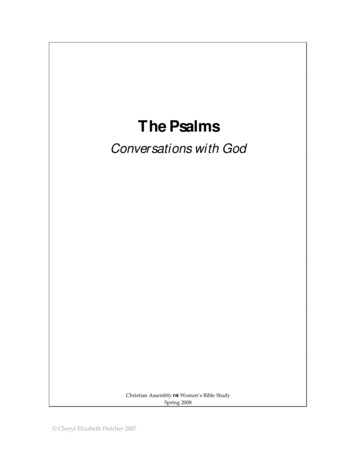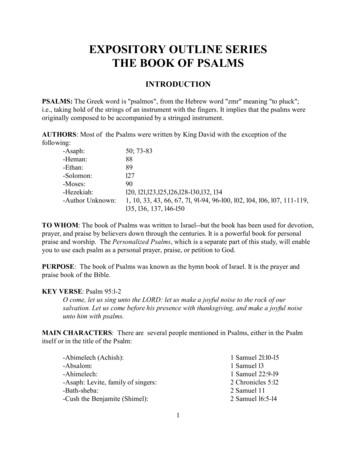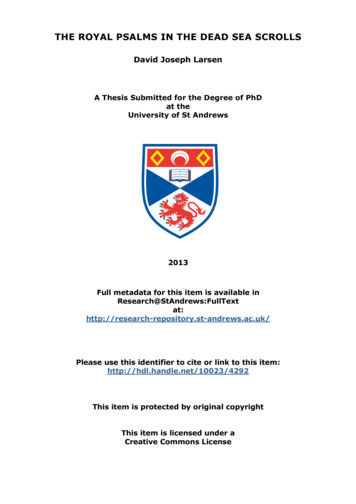
Transcription
THE ROYAL PSALMS IN THE DEAD SEA SCROLLSDavid Joseph LarsenA Thesis Submitted for the Degree of PhDat theUniversity of St Andrews2013Full metadata for this item is available pository.st-andrews.ac.uk/Please use this identifier to cite or link to this item:http://hdl.handle.net/10023/4292This item is protected by original copyrightThis item is licensed under aCreative Commons License
The Royal Psalms in the Dead Sea ScrollsDavid Joseph LarsenThis thesis is submitted in partial fulfilment for the degree of PhDat theUniversity of St AndrewsAugust 7, 2013
The Royal Psalms in the Dead Sea ScrollsDavid Joseph LarsenAbstractThis thesis examines the use and function of a specific group of Psalms, the so-called “RoyalPsalms,” among the texts of the Qumran library. From the time of their integration into the worshippractices of the Israelite people in the obscure past to the Second Temple period and beyond, these Psalmscontinued to be a source of inspiration to the Jewish people. Though there have been many studies thathave analyzed their Sitz im Leben, use, interpretation, and application for many different periods, no studyhas attempted a thorough analysis of their use among the Qumran documents. Analyses of the use in theQumran texts of certain individual Royal Psalms exist, but these do not attempt to cover the Royal Psalmsas a corpus. The present thesis will analyze the appearance in the Qumran library of the eleven generallyaccepted Royal Psalms: Pss 2, 18, 20, 21, 45, 72, 89, 101, 110, 132, and 144.This study explores whether or not these Psalms are to be found in the known Qumran Psalmsscrolls, variations or differences as compared to the Masoretic Text, how they are were interpreted inexegetical and other texts, quotations of and allusions to them, and how themes from the Royal Psalmscontribute to the structure and theology of non-canonical royal psalms found at Qumran. Anunderstanding of the use of the biblical Royal Psalms in these texts is of value for our comprehension ofwhat happened to the pre-exilic royal traditions as these hymns continued to be used in a post-monarchicsociety. This dissertation makes an original contribution toward these goals, establishing that there wasan interest on the part of the authors of many of the Qumran texts in royal themes although they livedlong after the monarchy had ended.
1The Royal Psalms in the Dead Sea ScrollsDavid Joseph LarsenChapter 1: The Royal Psalms and the History of Their Interpretation1. IntroductionThe discovery of a large number of Psalms scrolls, or scrolls containing Psalms, atQumran1 has generated considerable interest among scholars. This has led to numerousstudies regarding the contents of these scrolls, with much attention focused on comparisonswith the structure and contents of the ―canonical‖ Psalter of the Hebrew Bible and theinterpretation of the Psalms2 in the corpus of the Dead Sea Scrolls. Studies that fall into theformer category often focus on the entire corpus of Pss found at Qumran whereas the researchinto the latter tends to be conducted as part of larger works on biblical quotations, allusions,or interpretation in the Scrolls. The purpose of this study is to focus on a specific group ofPss, the so-called ―Royal Psalms,‖3 in order to elucidate their use and function among thetexts of the Qumran library. The frequent quotations of or allusions to the RPss (especiallyPss 2 and 110) as messianic proof-texts in the New Testament are well known. Likewise,scholars, especially in the early twentieth century, have studied the role of these Pss in ancientIsrael, later prophecy, and Second Temple Judaism.The impetus for this doctoral thesis stems from the fact that although many studieshave been conducted into the use of the larger corpus of canonical Pss in the Qumran library,there is no comprehensive treatment of the use of the RPss in particular. Analyses of certainindividual RPss exist, but they do not attempt to cover the RPss as a corpus. Whereas thesestudies are limited in scope, the present thesis will analyze the appearance in the Qumranlibrary of the eleven generally-accepted RPss: Pss 2, 18, 20, 21, 45, 72, 89, 101, 110, 132, and144. We will explore topics such as whether or not these Pss are to be found in the knownPss scrolls, variations or differences as compared to the Masoretic Text, how they are wereinterpreted in exegetical and other texts, quotations of and allusions to them, and how themesfrom the RPss contribute to the structure and theology of other Qumran texts.1There are at least thirty-six scrolls or manuscripts discovered at Qumran that contain Psalms. SeePeter W. Flint, The Dead Sea Psalms Scrolls and the Book of Psalms (Leiden; New York; Köln: Brill,1997), 2.2Henceforth, Ps (singular) and Pss (plural).3Henceforth, RPs (singular) and RPss (plural).
21.1 Background: Scholarship on the RPss, Their Use and Interpretation1.1.1 Gunkel and the RPss as a Form-Critical CategoryWhen Hermann Gunkel developed his ―form-critical‖ method and applied it to theHebrew Bible‘s Psalter, he identified shared ―forms‖ that he used to classify the various Pssinto genres. One of his categories, which he termed ―Royal Psalms,‖4 included Pss 2, 18, 20,21, 45, 72, 101, 110, 132, and 144:1-11, with 89:47-52 as more distantly related. Gunkel‘sRPss, however, were not grouped together due to their shared form, but were ratherassociated by their shared content matter and supposed ―life setting.‖ The Pss that Gunkeldesignated as royal thus have no characteristic structure, although various of the other formsmay be found in them (lament, Ps 89; individual thanksgiving, Ps 18, etc.).In his book Einleitung in die Psalmen (Introduction to the Psalms), Gunkel laid downhis criteria for what classifies a psalm as royal. His major points may be summarized asfollows:1. They are concerned entirely with kings.52. While the king is often referred to in the third person, some Pss also portray theking, himself, as speaking (Pss 2; 18; 101; 132:1-10; 144:1-11; cf. also 89:47-52).63. These Pss conceptualize reigning native kings (date is pre-exilic).4. They had their ―life setting‖ in royal celebrations. Gunkel associated the situationsapparent in these Pss with the many celebrations and festivals depicted in the biblicaltexts, as described in Esther 1:4 and in various passages in the books of Kings andSamuel, as having been organized by or for the Israelite kings.5. They describe settings similar to celebrations that took place in the Ancient NearEast: e.g., Assyria and Egypt. 76. The general situation of the songs is that they were performed in the presence ofthe king and his dignitaries in the palace or in the sanctuary. 87. A characteristic ―indefinite type of speech‖ stands out. With the exception ofDavid and Melchizedek, no kings are mentioned by name. Likewise, there are noreferences to real situations or historical events. Songs can plausibly be transferredfrom one ruler to another.94The term ―Royal Psalms‖ was used in the early nineteenth century by Wilhelm de Wette to refer tothose Psalms which had been considered messianic, which he understood to refer to reigning kings ofIsrael/Judah and which celebrated the ―office‖ of kingship. See W. M. L. de Wette, Commentar überdie Psalmen (Heidelberg: J. C. B. Mohr, 1811), 4.5Hermann Gunkel and Joachim Begrich, Introduction to the Psalms: The Genres of the Religious Lyricof Israel, Mercer Library of Biblical Studies (Macon, Ga.: Mercer University Press, 1998), 99.6Ibid., 99.7Ibid., 100-01.8Ibid., 102.9Ibid., 112.
3More recently, Scott Starbuck provided a concise definition in his 1996 monographon Court Oracles in the Psalms: ―‗Royal Psalm‘ is a scholarly typology, a classification labelapplied by commentators to Psalms which laud historical human kingship or feature thereigning monarch as the protagonist.‖10Gunkel‘s delineation of these RPss established a standard that became, and has been,accepted by most Pss scholars and built upon by subsequent thinkers. Although many of thesesucceeding thinkers would expand the number of Pss they identified as royal, theirenumerations vary significantly. Many of these theories, especially those envisioning dozensof pre-exilic RPss, have not been widely accepted. However, most scholars are willing toaccept at least Gunkel‘s minimum of ten RPss11 with the eleven that he was willing toenumerate, including Ps 89, as noted above, generally accepted by modern scholars as RPss.121.1.2 Views on the Life Setting of the RPss in Ancient Israel1.1.2.1 Psalm 2Gunkel saw Ps 2 as part of an enthronement festival of the Davidic king. He notesthat there is an ―entire drama‖ depicted, in which the subjugated peoples try to rebel againstthe king, but he keeps them in bonds.13 There are in this psalm the frequently repeated themesof conflict with foreign rulers and miraculous salvation by Yahweh, set in the context of theenthronement of Yahweh‘s king, and the promise to him of power and victory. Peter Craigiesees a coronation which would have involved ―the setting of a crown upon the new king‘shead, the formal presentation of a document to the new king, and his proclamation andanointing (cf. 2 Kgs 11:12).‖14 John Eaton describes the major items of this enthronementceremony as: anointing (cf. v. 2); installation (v. 6); legitimation (v. 7); and empowerment (v.10Scott R. A. Starbuck, Court Oracles in the Psalms: The So-Called Royal Psalms in their AncientNear Eastern Context (Atlanta: Society of Biblical Literature, 1999), 1-2. See also Mark David Futatoand David M. Howard, Interpreting the Psalms: An Exegetical Handbook (Grand Rapids: Kregel,2007), 181.11See, for example, Klaus Seybold, Introducing the Psalms (Edinburgh: T&T Clark, 1990); John Day,Psalms, T & T Clark Study Guides (London; New York: T & T Clark International, 2003); LeopoldSabourin, The Psalms: Their Origin and Meaning (Staten Island, N.Y.: Alba House, 1974); W. H.Bellinger, Psalms: Reading and Studying the Book of Praises (Peabody, Mass.: HendricksonPublishers, 1990); S. E. Gillingham, Psalms through the Centuries, Blackwell Bible Commentaries(Malden, Mass.: Blackwell Pub., 2007).12See Starbuck, Court Oracles, 2.13Gunkel and Begrich, Introduction to the Psalms, 102. See also Mitchell Dahood, Psalms I: 1-50, TheAnchor Bible (Garden City, N.Y.: Doubleday, 1965), 7. For additional studies on Ps 2, see P.L. Kunz,―Der 2. Psalm in neuer Sicht,‖ BZ 20 (1976), 238-42; G. Wilhelmi, ―Der Hirt mit dem eisernenSzepter. Uberlegungen zu Psalm II 9,‖ VT 27 (1977), 196-204; J. T. Willis, ―A Cry of Defiance—Psalm 2,‖ JSOT 47 (1990), 33-50.14Peter C. Craigie, Psalms 1-50, Word Biblical Commentary 19 (Waco, Tex.: Word Books, 1983), 64.
49, scepter, etc.).15 Similarities can be seen in the biblical accounts of the enthronement ofDavidic kings, such as those described in 1 and 2 Kings, at the coronations of Solomon (1Kgs 1:32-48; cf. 1 Chr 29) and Joash (2 Kgs 11). In these accounts, the kings are bothanointed by the priest and/or prophet (1 Kgs 1:34, 39; 1 Chr 29:22; 2 Kgs 11:12) and alsocrowned and/or enthroned (1 Chr 29:23; 1 Kgs 1:46; 2 Kgs 11:12). Haney notes that thispsalm is highly ideological ―because nowhere in the history of Yahweh‘s people do we seethat the king on Zion was/is represented as the great king of the earth.‖161.1.2.2 Psalm 18For Gunkel, this psalm celebrates the day that the king returned from battle, crownedwith victory, and safe from all danger.17 It is a majestic thanksgiving song spoken by the kinghimself. Gunkel also notes that a portion of this song appears in Ps 118:10-12, which appearsto be a ―thanksgiving liturgy.‖18 He sees it as borrowing from the genre he calls ―individualthanksgiving Psalms.‖19 A parallel text to Ps 18 can be found in 2 Samuel 22.20The psalm praises Yahweh for coming to the king‘s aid in the conflict against hisenemies. In this conflict, the king is almost overcome by death, perdition, Sheol, and thechaotic waters. He cries to Yahweh for deliverance and Yahweh hears him from his holytemple. There is a highly dramatic description of the salvation of Yahweh. He reaches downand lifts the king up from the many waters (which are equated with the king‘s enemies) andsets him ―upon his heights‖ (v. 33).21 The king is endowed with great power and is givenvictory over his foes in idealistic language (which reflects the language of Yahweh‘s victory).He is exalted above his adversaries and set as head of the nations. Likewise, the retributionwarned of in Ps 2 against the rebellious foreign kings seems to see its fulfillment here. Thereis a pattern in these psalms of suffering or defeat, deliverance by Yahweh, conquering ofenemies, and exaltation or enthronement.Klaus Seybold sees Psalm 18 as part of a ―Theophany of God‖ ritual sequence: a preexilic liturgical tradition which re-enacted the advent/appearance of God ―by the recitation ofthe festival pericope, or by dramatic cultic symbols‖ such as the cloud of smoke, blast of15J. H. Eaton, Kingship and the Psalms, Studies in Biblical Theology, 32 (London: S. C. M. Press,1976), 112.16Randy G. Haney, Text and Concept Analysis in Royal Psalms (New York: Peter Lang, 2002), 112.Emphasis in original.17Gunkel and Begrich, Introduction to the Psalms, 100. See also F. M. Cross and D. N. Freedman, ―ARoyal Song of Thanksgiving: II Samuel 22 Psalm 18,‖ JBL 72, no. 1 (Mar., 1953), 15-34; S. Shnider,―Psalm XVIII: Theophany, Epiphany Empowerment,‖ VT 56, fasc. 3 (Jul., 2006), 386-398.18Gunkel and Begrich, Introduction to the Psalms, 102.19Ibid., 103. See also Craigie, Psalms 1-50, 171.20Craigie argues that 2 Sam 22 is the older text. He states, however, that there is ―some degree ofunanimity among scholars that Ps 18 is ancient, to be dated in the eleventh or tenth century B.C.‖Craigie, Psalms 1-50, 172.21Dahood‘s translation. Dahood, Psalms I, 103.
5trumpets, and festive cry. In essence, the Sinai theophany was reproduced in the temple ofJerusalem (see also Pss 50:2; 68; 17:15; 97).221.1.2.3 Psalm 20Gunkel sees Ps 20 as an intercession for the king during a celebration on the day thatthe king went to war (cf. Pss 68; 144:1-10; 1 Sam 13:9ff; 2 Chr 14:10; 20:4ff); and also whenhe returned in victory (Ps 20:6).23 Gunkel sees the central event of the ceremony as a divineoracle proclaiming victory for the king, and sees Isa 45:1-7, the promise of victory to Cyrus attime of war, as imitating this type of royal oracle.24 Similarly, Craigie labels the psalm a―royal liturgy‖ that may have formed part of a ritual performed before the king went to war,as was common in the ancient Near East.25The presence of a hypothetical oracle after verse 5 helps establish the ritual characterof the setting of this psalm. Verses 6-8 seem to be spoken by one with priestly and propheticauthority who is under oracular inspiration.26 Furthermore, in this setting, the king has alsooffered sacrifices and prayers (vv. 3-4).1.1.2.4 Psalm 21Gunkel categorizes this psalm as likely pertaining to a festival of a special nature,such as the birthday of the ruler or the anniversary of his enthronement (see also Hos 7:6; Ps72).27 He notes, ―On the anniversary of the ruler's taking of power, the poet sings about theruler's majesty and righteousness, his victories over his enemies, and about his reign over thewhole world (Pss 21; 72).‖28 Dahood sees it as ―a psalm of thanksgiving for the royal victoryprayed for in the preceding psalm.‖29 According to Eaton, it is generally agreed that thispsalm should be connected to the enthronement rites of the Davidic king.30 AlthoughMowinckel notes that it is similar to the genre of the ―thanksgiving Psalms‖ and highlightsthe fact that it is an intercessory prayer on behalf of the king, he concludes that it ―belongsrather to the festivities at the annual celebration of the day of anointing and enthronement.‖3122Seybold, Introducing the Psalms, 133-34.Gunkel and Begrich, Introduction to the Psalms, 100, 02. See also Dahood, Psalms I, 127.24Gunkel and Begrich, Introduction to the Psalms, 102.25Craigie, Psalms 1-50, 185. See also Sigmund Mowinckel, The Psalms in Israel's Worship, trans.D.R. Ap-Thomas, 2 vols., vol. 1 (Oxford: Basil Blackwell, 1962), 225; Z. Zevit, ―The Common Originof the Aramaicized Prayer to Horus and of Psalm 20,‖ Journal of the American Oriental Society 110,no. 2 (Apr. - Jun., 1990), 213-228.26Eaton, Kingship and the Psalms, 116.27Gunkel and Begrich, Introduction to the Psalms, 100. See also F. C. Fensham, ―Ps 21—A CovenantSong?‖ ZAW 77 (1965), 195-202.28Gunkel and Begrich, 102. Emphasis in original.29Dahood, Psalms I, 131.30Eaton, Kingship and the Psalms, 117.31Mowinckel, Psalms, vol. 1, 224.23
6Craigie asserts that this royal liturgy involved various participants whose voices are heard indifferent parts of the psalm, including the king, one or more priests and/or prophets, and acongregation.321.1.2.5 Psalm 45Ps 45 describes a royal marriage in elaborate and colorful imagery. Gunkel considersit a ―celebration of the marriage of the prince‖ from the northern kingdom of Israel.33 Craigienotes that it is designated as a ―love song‖ and that it should be seen specifically as a―wedding song,‖ a type of song which has no parallel elsewhere in the psalter.34 According toCraigie, the psalm implies that there is a procession (vv. 15b-16) and reference to thecovenant concerning the continuity of the royal dynasty (vv. 17-18).35The maskil or ―sage‖ addresses the king directly and exalts him with high praise,surpassing that of most any other description. ―You are the fairest of the sons of men; grace ispoured upon your lips; therefore God has blessed you forever. Gird your sword upon yourthigh, O mighty one, in your glory and majesty!‖ (Ps 45:2-3). His prowess and strength inbattle are acclaimed.Perhaps the most striking line in this list of praises for the king is in v. 7, where themaskil addresses him, saying, ―Your throne, O God, endures forever and ever.‖ AlthoughDahood renders this in English as ―The eternal and everlasting God has enthroned you,‖36 theRSV has ―Your divine throne endures for ever and ever,‖37 and other such variationsemphasize the idea that the throne is from God, John Day asserts that the most naturalrendering of the Hebrew is the vocative, ―O God.‖38 Mowinckel argued that Ps 45 is similarto other ancient Near Eastern kingship ideological writings in which the king is ―more or lessclearly described and praised as a god,‖ one who ―upholds the world order, creates andsecures life and fertility, defends his people against all his enemies, ‗rises‘ (as the sun) overthe earth, etc.‖39 We should also note, however, that the psalm makes it clear who the sourceof the king‘s exalted status is, as verse 7 declares, ―Therefore God, your God, has anointedyou with the oil of gladness above your fellows.‖32Craigie, Psalms 1-50, 189.Gunkel and Begrich, Introduction to the Psalms, 100. Eaton finds no reason to associate this psalmwith the Northern Kingdom as opposed to Judah. Eaton notes, ―The allusions to ivory and to Tyre areas appropriate to the Solomonic kingdom as to Samaria.‖ Eaton, Kingship and the Psalms, 118.34Craigie, Psalms I, 337.35Ibid., 340.36Dahood, Psalm I, 269.37See Craigie, Psalms 1-50, 339. Craigie asserts that ―the king‘s throne is the earthly counterpart ofGod‘s throne.‖38John Day, Psalms, 103-104. For more on this issue, see B. Couroyer, ―Dieu ou roi? Le vocatif dansle Psaume XLV (vv 1-9),‖ RB 78 (1971), 233-41; J. A. Emerton, ―The Syntactical Problem of Ps 45:7,‖JSS 13 (1968), 58-63; J. R. Porter, ―Psalm XLV.7,‖ JTS 12 (1961), 51-53.39Mowinckel, Psalms, vol. 1, 74-75.33
71.1.2.6 Psalm 72Gunkel infers that this psalm, like Ps 21, could have been part of one of a number of"special festivals, like the birthday of the ruler or the anniversary of his taking power ‖when ―the poet sings about the ruler's majesty and righteousness, his victories over hisenemies, and about his reign over the whole world.‖40 Marvin Tate suggests that Ps 72 ―isprobably also an accession or coronation psalm, a prayer for the king at the beginning of hisreign.‖41 The idea that the king is to be a righteous judge is emphasized.Holladay notes that Ps 72 is similar to Ps 2 ―because both Psalms call downYahweh‘s blessing on the king,‖ which leads him to believe that Ps 72 was also composed forthe king‘s enthronement. Similar to Ps 2‘s assertion that Yahweh‘s king is invincible, Ps 72desires that the king live as long as the sun and moon (v. 5) and that he rule from ―sea to sea,and from the River to the ends of the earth!‖ (v. 8).42 The psalmist refers to the king and theking‘s son, traditionally identified as David and Solomon. The psalm ends with the words,―the prayers of David, the son of Jesse are ended,‖ which serve to conclude the second of thefive books of the Hebrew Bible‘s Psalter.1.1.2.7 Psalm 89Although he saw royal elements in Ps 89, Gunkel refrained from classifying thispsalm as fully royal. However, subsequent scholars have usually added it to the list of RPss.43The psalm is complex, moving from praising Yahweh‘s love, mercy, and faithfulness, todiscussion of his everlasting covenant with the house of David, to more praise for Yahweh‘svictory over the sea/Rahab, the creation of the cosmos, and so forth. A vision from Yahwehis recited in the first person, declaring what Yahweh had promised as part of his covenant.He would make the Davidic king his first-born, the highest of the kings of the earth (v. 27). Ifhe is righteous, the king will always be protected and will always be victorious over his40Gunkel and Begrich, Introduction to the Psalms, 100, 02. Emphasis in original. See also S. M. Paul,―Psalm 72:5—A Traditional Blessing for the Long Life of the King,‖ JNES 31 (1972), 351-54; P.Veugelers, ―Le Psaume LXXII, poeme messianique?‖ ETL 41 (1965), 317-43.41Marvin E. Tate, Psalms 51-100, Word Biblical Commentary 20 (Dallas: Word Books, 1990), 222.42William Lee Holladay, The Psalms through Three Thousand Years: Prayerbook of a Cloud ofWitnesses (Minneapolis: Fortress Press, 1993), 38. See also Dahood, Psalms II: 51-100, The AnchorBible (Garden City, N.Y.: Doubleday, 1968), 179; Amos Ḥakham, The Bible Psalms with theJerusalem Commentary: Volume Two, Psalms 58-100 (Jerusalem: Mosad Harav Kook, 2003), 127.43See, e.g., Starbuck, Court Oracles, 2; A. R. Johnson, Sacral Kingship in Ancient Israel (Cardiff:University of Wales Press, 1967), 22-23; G. W. Ahlström, Psalm 89. Eine Liturgie aus dem Ritual desleidenden Königs (Lund: CWK Gleerup, 1959), 26; Eaton, Kingship and the Psalms, 121-22; J.-B.Dumortier, ―Un rituel d‘intronisation: le Ps. LXXXIX 2-38,‖ VT 22 (1972), 176-96; Dahood, PsalmsII: 51-100, 311; Aage Bentzen, King and Messiah (London: Lutterworth Press, 1955), 29. A recentreview of the debates over the genre of Ps 89 can be found in Matthew W. Mitchell, ―Genre Disputesand Communal Accusatory Laments: Reflections on the Genre of Psalm LXXXIX,‖ VT 55, fasc. 4(Oct., 2005), 511-527.
8enemies. Paradoxically, there is a break and the rest of the psalm consists of a lamentation bythe king in which he complains to Yahweh that he has rejected the king and renounced hiscovenant. His throne and kingdom are lost and he has been brought to shame. The king bearsthe insults of the peoples and Yahweh‘s anointed is taunted and mocked by his enemies.Gunkel saw here the fall of the Davidic dynasty in the fifth-century, lamented by adescendent of David who no longer has a throne to inherit. Mowinckel placed the setting inthe pre-exilic monarchy, where he sees the Davidic king lamenting about the defeat he hassuffered at the hands of his enemies, ―who have pulled down his castles and wasted hisland.‖44Due to the complexity of the psalm, many scholars, including Gunkel, haveconcluded that it must be, as Tate puts it, ―a collection of disparate parts, probably reflecting ahistory of composition.‖45 Lipiński, for example, uses the Qumran text 4QPs89 as the basisfor arguing that verses 2-5 and 20-38 of Ps 89 were part of an original royal psalm, and thatthe other sections were added in later.46 Eaton, however, argues for the unity of the entirecomposition due to the fact that in the last part of the psalm ―the singer emerges as himselfthe humiliated anointed (vv. 48-52).‖47 Fishbane, following Sarna,48 argued that Ps 89 is anexegetical adaptation of the narrative in 2 Sam 7,49 whereas Tate asserts that it is ―likely to bea reinterpretation of an earlier text or a recension of the same tradition‖ as that found in 2Sam 7.50Broyles argues that in conjunction with the celebration of Yahweh‘s glory andkingship as described in this psalm, we should likely imagine a procession of the Ark of theCovenant: we read of the ―festal shout‖ and the procession in the light of Yahweh‘scountenance (v. 15), and starting in verse 19 we hear the speech of Yahweh, rehearsing hiscovenant to David, as if He were present.5144Mowinckel, Psalms, vol. 1, 48.Tate, Psalms 51-100, 413. See, e.g., C. A. Briggs and E. G. Briggs, A Critical and ExegeticalCommentary on the Book of Psalms, vol. 2 (ICC; Edinburgh: T&T Clark, 1906), 250; Gunkel, DiePsalmen (HKAT; Göttingen: Vandenhoeck & Ruprecht, 1929), 386-94; E. Lipiński, Le poème royal duPsaume LXXXIX 1-5, 20-38 (Paris: Bagalla, 1967).46Lipiński, Le poème royal, 20-38.47Eaton, Kingship and the Psalms, 121.48Nahum M. Sarna, "Psalm 89: A Study in Inner Biblical Exegesis," in Studies in BiblicalInterpretation (Philadelphia: Jewish Publication Society, 2000), 319. Sarna sees Ps 89 as a midrash onNathan‘s oracle. For an opposing view, see Hans-Ulrich Steymans, ―‗Deinen Thron habe ich unter dengroẞen Himmeln festgemacht‘: die formgeschichtliche Nähe von Ps 89,4-5. 20-38 zu Texten vomneuassyrischen Hof," in Otto and Zenger (eds.), "Mein Sohn bist du" (Ps 2,7): Studien zu denKönigspsalmen (SBS 192; Stuttgart: Katholisches Bibelwerk, 2001), 184-251, at 212-16, 245 n. 140.Steymans argues that there is no direct dependence of Ps 89 on 2 Sam 7, although they share acommon background.49M. Fishbane, Biblical Interpretation in Ancient Israel (Oxford: Clarendon Press, 1985), 466-67.50Tate, Psalms 51-100, 416.51Craig C. Broyles, "The Psalms and Cult Symbolism: The Case of the Cherubim-Ark," in Interpretingthe Psalms: Issues and Approaches, ed. David Firth and Philip S. Johnston (Downers Grove, Ill.:45
91.1.2.8 Psalm 101Psalm 101, in Gunkel‘s view, was part of the enthronement festival, where ―the poetproclaims the honorable foundation of the king's government in his name.‖52 It is interestingthat although Gunkel does not hesitate to declare this psalm royal, it doesn‘t explicitlymention the king. Allen argues that the claim to judicial authority over ―Yahweh‘s city‖ inverse 8 implies that the psalm was composed by or for a king in the pre-exilic period.53Dahood calls this psalm a lament of a king who proclaims his innocence and wonders whenYahweh will respond and come to him.54 Holladay sees the king as the speaker and speculatesthat the psalm may have originally been the king‘s vow of moral purity, possibly on hiscoronation day.55 Ḥakham sees the psalm as possibly having been recited by the king everymorning as part of his ―Morning Service,‖ or, alternatively, on the day of his ascent to thethrone, ―when he would commit himself in the presence of all Israel to rule his kingdom withlovingkindness and justice.‖561.1.2.9 Psalm 110Gunkel saw the setting as similar to that of Ps 2, that it was part of the enthronementfestival, ―when the poet proclaims the divine selection of the ruler and the ruler'spriesthood.‖57 Allen suggests that the psalm ―may have been composed to celebrate David‘searlier conquest of Jerusalem and succession to Jebusite kingship (cf. 2 Sam 8:30).‖58Yahweh tells the king to sit at his right hand and that his enemies will be his footstool(see Ps 132:7). The king is to rule with a rod/scepter over his enemies (compare Ps 2:9). Theking is born ―from the womb of the morning‖ and has the ―dew‖ of youth. He is promisedthat he will be a priest after the order of Melchizedek forever. The Lord gives him victoryInterVarsity Press, 2005), 151. See also G. W. Ahlström, Psalm 89; Dumortier, ―Un rituel,‖ 176-96; J.M. Ward, ―The Literary Form and Liturgical Background of Psalm LXXXIX,‖ VT 11 (1961), 321-39.52Gunkel and Begrich, Introduction to the Psalms, 102. See also K. Galling, ―Der Beichtspiegel. Einegattungsgeschichtliche Studie,‖ ZAW 6 (1929), 125-30; O. Kaiser, ―Erwägungen zu Psalm 101,‖ ZAW74 (1962), 195-205; H. A. Kenik, ―Code of Conduct for a King: Psalm 101,‖ JBL 95 (1976), 391-403.53Leslie C. Allen, Psalms 101-150, Word Biblical Commentary, vol. 21 (Waco, TX: Word Books,1983), 3.54Dahood, Psalms III: 101-150, The Anchor Bible (Garden City, NY: Doubleday, 1970), 2.55Holladay, The Psalms through Three Thousand Years, 38. See also Ḥakham, The Bible Psalms withthe Jerusalem Commentary: Volume Three, Psalms 101-150 (Jerusalem: Mosad Harav Kook, 2003), 6.Ḥakham asserts: ―It seems likely that this psalm was originally intended to be recited by the king.‖56Ḥakham, Psalms 101-150, 6.57Gunkel and Begrich, Introduction to the Psalms, 102. See also Dahood, Psalms III, 112. Dahoodsees it as having been composed for a military victory. Additionally, see K. H. Bernhardt, Das Problemder altorientalischen Königsideologie im Alten Testament : unter besonderer Berücksichtigung derGeschichte der Psalmenexegese dargestellt und kritisch gewürdigt, VTSup 8 (Leiden: Brill, 1961); S.Schreiner, ―Psalm 110 und die Investitur des Hohenpriesters,‖ VT 27 (1977), 216-22.58Allen, Psalm 101-150, 85.
10over his enemies. David Mitchell asserts, ―the words as they stand suggest that the king isbeing offered a place in Yhwh‘s heavenly throne room or divine council.‖59It should be seen as significant that the king is declared to be a priest, and not afterthe order of Aaron, but after the order of Melchizedek. Ther
interpretation of the Psalms2 in the corpus of the Dead Sea Scrolls. Studies that fall into the former category often focus on the entire corpus of Pss found at Qumran whereas the research into the latter tends to be conducted as part of larger works on biblical quotations, allusions, or interpretation in the Scrolls.
